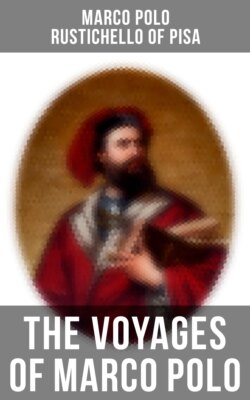Читать книгу The Voyages of Marco Polo - Марко Поло - Страница 62
На сайте Литреса книга снята с продажи.
NOTE 7.—
Оглавление"I said to the Kalif: 'Thou art old,
Thou hast no need of so much gold.
Thou shouldst not have heaped and hidden it here,
Till the breath of Battle was hot and near,
But have sown through the land these useless hoards
To spring into shining blades of swords,
And keep thine honour sweet and clear.
* * * * *
Then into his dungeon I locked the drone,
And left him to feed there all alone
In the honey-cells of his golden hive:
Never a prayer, nor a cry, nor a groan
Was heard from those massive walls of stone,
Nor again was the Kalif seen alive.'
This is the story, strange and true,
That the great Captain Alau
Told to his brother, the Tartar Khan,
When he rode that day into Cambalu.
By the road that leadeth to Ispahan." (Longfellow.)[1]
The story of the death of Mosta'sim Billah, the last of the Abbaside
Khalifs, is told in much the same way by Hayton, Ricold, Pachymeres, and
Joinville. The memory of the last glorious old man must have failed him,
when he says the facts were related by some merchants who came to King
Lewis, when before Saiette (or Sidon), viz. in 1253, for the capture of
Baghdad occurred five years later. Mar. Sanuto says melted gold was poured
down the Khalif's throat—a transfer, no doubt, from the old story of
Crassus and the Parthians. Contemporary Armenian historians assert that
Hulaku slew him with his own hand.
All that Rashiduddin says is: "The evening of Wednesday, the 14th of Safar, 656 (20th February, 1258), the Khalif was put to death in the village of Wakf, with his eldest son and five eunuchs who had never quitted him." Later writers say that he was wrapt in a carpet and trodden to death by horses.
[Cf. The Story of the Death of the last Abbaside Caliph, from the Vatican MS. of Ibn-al-Furat, by G. le Strange (Jour. R. As. Soc., April, 1900, pp. 293–300). This is the story of the death of the Khalif told by Ibn-al-Furat (born in Cairo, 1335 A.D.):
"Then Hulagu gave command, and the Caliph was left a-hungering, until his case was that of very great hunger, so that he called asking that somewhat might be given him to eat. And the accursed Hulagu sent for a dish with gold therein, and a dish with silver therein, and a dish with gems, and ordered these all to be set before the Caliph al Musta'sim, saying to him, 'Eat these.' But the Caliph made answer, 'These be not fit for eating.' Then said Hulagu: 'Since thou didst so well know that these be not fit for eating, why didst thou make a store thereof? With part thereof thou mightest have sent gifts to propitiate us, and with part thou shouldst have raised an army to serve thee and defend thyself against us! And Hulagu commanded them to take forth the Caliph and his son to a place without the camp, and they were here bound and put into two great sacks, being afterwards trampled under foot till they both died—the mercy of Allah be upon them."—H. C.]
The foundation of the story, so widely received among the Christians, is to be found also in the narrative of Nikbi (and Mirkhond), which is cited by D'Obsson. When the Khalif surrendered, Hulaku put before him a plateful of gold, and told him to eat it. "But one does not eat gold," said the prisoner. "Why, then," replied the Tartar, "did you hoard it, instead of expending it in keeping up an army? Why did you not meet me at the Oxus?" The Khalif could only say, "Such was God's will!" "And that which has befallen you was also God's will," said Hulaku.
Wassáf's narrative is interesting:—"Two days after his capture the Khalif was at his morning prayer, and began with the verse (Koran, III. 25), 'Say God is the Possessor of Dominion! It shall be given to whom He will; it shall be taken from whom He will: whom He will He raiseth to honour; whom He will He casteth to the ground.' Having finished the regular office he continued still in prayer with tears and importunity. Bystanders reported to the Ilkhan the deep humiliation of the Khalif's prayers, and the text which seemed to have so striking an application to those two princes. Regarding what followed there are different stories. Some say that the Ilkhan ordered food to be withheld from the Khalif, and that when he asked for food the former bade a dish of gold be placed before him, etc. Eventually, after taking counsel with his chiefs, the Padishah ordered the execution of the Khalif. It was represented that the blood-drinking sword ought not to be stained with the gore of Mosta'sim. He was therefore rolled in a carpet, just as carpets are usually rolled up, insomuch that his limbs were crushed."
The avarice of the Khalif was proverbial. When the Mongol army was investing Miafarakain, the chief, Malik Kamál, told his people that everything he had should be at the service of those in need: "Thank God, I am not like Mosta'sim, a worshipper of silver and gold!"
(Hayton in Ram. ch. xxvi.; Per. Quat. 121; Pachym. Mic. Palaeol. II. 24; Joinville, p. 182; Sanuto, p. 238; J. As. sér. V. tom. xi. 490, and xvi. 291; D'Ohsson, III. 243; Hammer's Wassáf, 75–76; Quat. Rashid. 305.)
NOTE 8.—Nevertheless Froissart brings the Khalif to life again one hundred and twenty years later, as "Le Galifre de Baudas." (Bk. III. ch. xxiv.)
[1] Not that Alaü (pace Mr. Longfellow) ever did see Cambalu.
